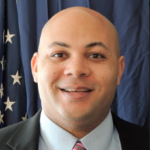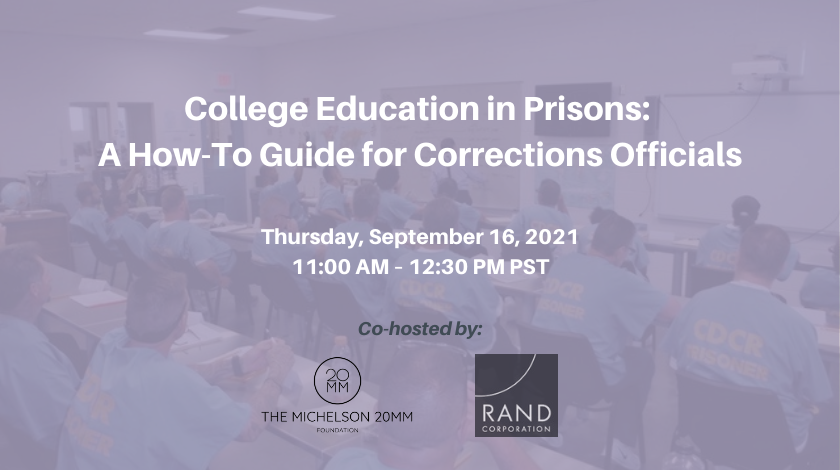College Education in Prisons:
A How-To Guide for Corrections Officials
Thursday, September 16, 2021 | 11:00 a.m.-12:30 p.m. PST
Click here to register.
The expansion of national access to higher education in prison programming is on the horizon. December 2020 marked the end of a 26-year period that prevented currently incarcerated students from accessing Pell dollars to fund their education. The passage of Pell Reinstatement can be attributed to the success of the Second Chance Pell experimentation sites initiated under President Obama and expanded during President Trump’s tenure, highlighting the bipartisanship and success of higher education in prison.
Ensuring high-quality college programming in prison has become a priority as Pell is being reinstated, Second Chance Pell sites are growing, and more states nationwide are removing barriers to funding for college programming in correctional facilities and financial aid for currently incarcerated students. However, the need to train correctional officials remains a cross-sector, professional development gap for expanding high quality postsecondary education programs in prison.
The Michelson 20MM Foundation awarded the RAND Corporation a Spark Grant to address this training gap, resulting in their recent publication, “What Corrections Officials Need to Know to Partner with Colleges to Implement College Programs in Prisons.” The Corrections Guide is intended as a starting point for corrections officials who are considering whether to implement a college program within their prison system or who are seeking additional information to ensure the success of an existing program. Corrections officials are essential cross-sector stakeholders in creating successful, high-quality higher education programming in prison, but are often not trained in how to best run these programs in their facilities. This guide serves as an essential resource for streamlining implementation and improving connectivity between correctional administrators and educators.
Join the Michelson 20MM Foundation and the RAND Corporation on September 16th for the event, “College Education in Prisons: A How-To Guide for Corrections Officials.” The program will bring concepts from the guide to life by highlighting key takeaways and the experiences of corrections officials and higher education experts in launching college programs in prison.
This conversation will address common questions and concerns corrections officials and higher education practitioners have about starting, maintaining, and strengthening a college program. By providing guidance about in-prison college programs, the event will help corrections officials assess potential opportunities and develop best practices in partnering with colleges to implement an in-prison program. The event will dive into the basics of in-prison college programs, the transformative benefits to students in a correctional facility, funding and resources needed for programming and students, partnerships with institutions of higher education, and correctional staff buy-in for program success.
Speakers Include:
SEAN ADDIE
Director of Correctional Education, U.S. Department of Education
 Sean Addie is the Director of Correctional Education in the Department of Education’s Office of Correctional Education in the Office of Career, Technical, and Adult Education. His work includes administering adult and juvenile reentry education grant programs, managing technical assistance initiatives around correctional and reentry initiatives focused on young adult diversion and integrated education and training, and coordinating inter- and intra-agency efforts pertaining to correctional and reentry education.
Sean Addie is the Director of Correctional Education in the Department of Education’s Office of Correctional Education in the Office of Career, Technical, and Adult Education. His work includes administering adult and juvenile reentry education grant programs, managing technical assistance initiatives around correctional and reentry initiatives focused on young adult diversion and integrated education and training, and coordinating inter- and intra-agency efforts pertaining to correctional and reentry education.
TODD A. BUTLER
Dean of Arts, Sciences, and Business Administration, Jackson College
 Dr. Todd A. Butler serves as the Dean of Arts, Sciences, and Business Administration at Jackson College in Jackson, Michigan. Nearly a decade ago, Todd was tasked with restarting Jackson College’s prison education program, which had been closed since 1994. Under his leadership and through the support of the Vera Institute, the Michigan Department of Corrections, the Federal Bureau of Prisons, and other mentors and partners, the program grew from 18 students to 800 students at eight facilities throughout Michigan. Jackson College was the sole provider of higher education in Michigan for the three-state demonstration project, “Pathways from Prison,” as well as one of the initial institutions leading the Second Chance Pell authorization from the Department of Education.
Dr. Todd A. Butler serves as the Dean of Arts, Sciences, and Business Administration at Jackson College in Jackson, Michigan. Nearly a decade ago, Todd was tasked with restarting Jackson College’s prison education program, which had been closed since 1994. Under his leadership and through the support of the Vera Institute, the Michigan Department of Corrections, the Federal Bureau of Prisons, and other mentors and partners, the program grew from 18 students to 800 students at eight facilities throughout Michigan. Jackson College was the sole provider of higher education in Michigan for the three-state demonstration project, “Pathways from Prison,” as well as one of the initial institutions leading the Second Chance Pell authorization from the Department of Education.
LOIS M. DAVIS
Senior Policy Researcher, RAND Corporation

Dr. Lois M. Davis is a Senior Policy Researcher at RAND with expertise in correctional education, prisoner reentry, and public safety. Lois has over 27 years experience in conducting program evaluations and working with agencies and organizations involved in service provision, policymaking, or the administration of programs. She co-authored the 2021 guidebook, “What Corrections Officials Need to Know to Partner with Colleges to Implement College Programs in Prisons.” She currently is leading an assessment of the impact of COVID-19 on correctional education within state prison systems and the evaluation of the Minnesota Department of Corrections’ Career Navigators Program. She previously led the evaluation of the three-state “Pathways from Prison to Post-Secondary Education” demonstration project and the national evaluation funded under the Second Chance Act to assess the effectiveness of correctional education programs for incarcerated adults. Lois is a former Bureau of Justice Statistics Fellow, National Institute of Mental Health Postdoctoral Fellow, and Pew Health Policy Fellow.
HEATHER M. GAY
Education Manager, Michigan Department of Corrections
 Heather M. Gay began her career in the Michigan Department of Corrections (MDOC) in December 1999. She is currently the State Assistant Administrator for Prisoner Education within the Offender Success Administration. Heather has served in various positions throughout her career within the MDOC, including teacher, principal and programs manager. She was recently elected to serve as president of the Correctional Education Association (CEA). As president of the Association of State and Federal Directors of Correctional Education, she assists in revitalizing the national council of educational state directors and improving communication among all educational leaders throughout the nation. Heather also assisted in leading the education team in the creation of the Vocational Village Model, stemming from the “Pathways from Prison to Post Secondary Grant Initiative.”
Heather M. Gay began her career in the Michigan Department of Corrections (MDOC) in December 1999. She is currently the State Assistant Administrator for Prisoner Education within the Offender Success Administration. Heather has served in various positions throughout her career within the MDOC, including teacher, principal and programs manager. She was recently elected to serve as president of the Correctional Education Association (CEA). As president of the Association of State and Federal Directors of Correctional Education, she assists in revitalizing the national council of educational state directors and improving communication among all educational leaders throughout the nation. Heather also assisted in leading the education team in the creation of the Vocational Village Model, stemming from the “Pathways from Prison to Post Secondary Grant Initiative.”
CARROLL SERON
Associate Director, UCI LIFTED
 Dr. Carroll Seron is Associate Director of LIFTED (Leveraging Inspiring Futures Through Educational Degrees) at the University of California, Irvine (UCI). She is professor emerita in the Department of Criminology, Law and Society with a courtesy appointment in the Department of Sociology at UC Irvine. Carroll studies the organizations and culture of the professions, including law, policing, and engineering. In her retirement, she is working with colleagues to develop UCI LIFTED, a demonstration project to extend access to currently incarcerated students to earn a B.A. degree through the University of California.
Dr. Carroll Seron is Associate Director of LIFTED (Leveraging Inspiring Futures Through Educational Degrees) at the University of California, Irvine (UCI). She is professor emerita in the Department of Criminology, Law and Society with a courtesy appointment in the Department of Sociology at UC Irvine. Carroll studies the organizations and culture of the professions, including law, policing, and engineering. In her retirement, she is working with colleagues to develop UCI LIFTED, a demonstration project to extend access to currently incarcerated students to earn a B.A. degree through the University of California.
Register for “College Education in Prisons: A How-To Guide for Corrections Officials,” September 16, 2021, at 11:00 AM PST.

I am looking forward to the information.